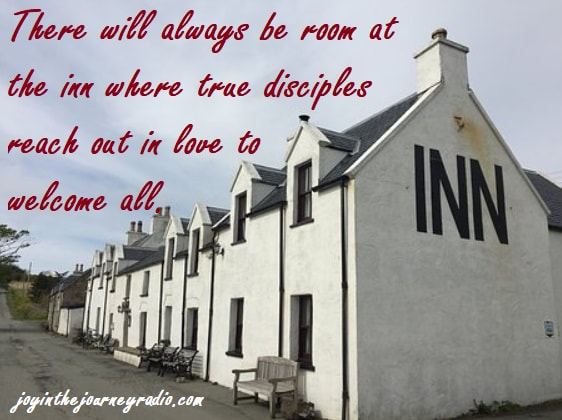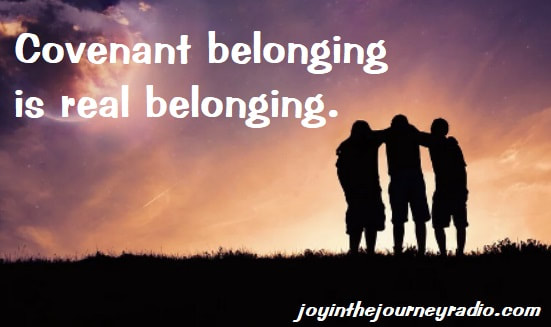What does surprise me is that singles have been the majority for the past two years and only now are we hearing the Brethren talk about it openly. Whatever the reason for its delay, the announcement is no less welcome. It marks a noticeable and important turning point in the unfolding of the Restoration, declaring to the world that, no matter your background or circumstances, there is room in the inn for you. Leave the old behind  It hasn't always been that way in practice. You don't need to be a long-time listener of the program to know the traditional family-centered culture of the Church has challenged many singles to feel like they truly belonged. But probably only long-time listeners know some of my experiences with that challenge. Of all of the different wards I've attended, one of the most challenging was the midsingles ward I attended in Seattle. That assertion may surprise some who think that I as a single adult should feel a greater sense of belonging in a ward filled with other singles. But it was not so. Far from it, I routinely felt isolated, ignored, and invisible. Memories of those days played in my mind as Elder Gong spoke of a gospel culture of belonging, one in which everyone is important, even essential. What he describes is the exact opposite of what I experienced. To be fair, I've been a part of some really outstanding wards filled with people who really reached out to help me feel welcome and included. And these wards entered my life at times when I need relief and rest from wrestling with the challenge presented in other wards, like the midsingles ward in Seattle. The Lord's hand was definitely evident in those moves. Embrace a new season  The Lord's hand was also evident in Elder Gong's remarks. As he spoke of the Church as a place where "we are all equal, with no second-class groups," Elder Gong provided more impetus for the change that has been unfolding now for the past several years. Long-time listeners to the program will know what I'm talking about here — a change in the culture away from a center on family and towards a center on Christ. A family-centered culture means you need to have a family to belong, but a Christ-centered culture means you need to have Christ to belong. Singles by definition don't have a complete family of their own, but everyone can have a covenant relationship with and devoted discipleship of the Lord. Elder Gong recognizes as much when he declares,
Elder Gong identifies a change in the culture more explicitly when he taught,
Oh, the times, they are a-changin'! Keep the covenant path  Hearing Elder Gong describe the Christ-centered culture I've advocated on this platform for years set me on fire. It also filled me with deep gratitude to God He hasn't forsaken His single sons and daughters but rather remembers every single one (pun intended). We don't always know what the future will bring, but we can always know the goodness of God as He dispenses grace and tender mercies in hours of need. "As we create room in His Inn," Elder Gong declares, "welcoming all, our Good Samaritan can heal us on our dusty mortal roads." That is why only in helping others can we receive the help we each really need. There will always be room in the inn where true disciples reach out in love to welcome all and keep all on the covenant path. As we each contribute in our own way to that effort, we will embrace a truer, purer gospel culture in which all truly belong. And that will bring us more joy in our journey.
0 Comments
Many singles hold to that assumption under the guise of having standards. They seem to see themselves acting nobly in a chaotic dating world by adhering to their standard that insists on only the best. But such standards actually impede progress in one’s dating journey. So if you insist on believing you’ll be happy only with the most attractive companion, then you’re letting your standards keep you single. The falsity How does one progress in dating? As I discuss in my upcoming book about dating, to progress to each next stage of the journey, you must make an agreement. No agreement means no progress. Period. In the first stage of the dating journey, you meet new people and build friendships. In the next stage, you casually date candidates you’ve befriended. These activities require openness to social interactions. Otherwise, you’ll likely never get the agreement you need to progress from friendship to casual dating and on to exclusive dating. But assuming you can be happy in life only if your partner is the “best” or most attractive type limits those interactions. That faulty assumption will encourage you to engage only with those who meet your standards, because what’s the point, after all, in “wasting your time” with people who simply won’t do romantically because they aren’t the “best”? God’s plan  Mathematically, it just isn’t possible for everyone to have the “best.” Yet many singles cling tenaciously to the hope they’ll be one of the few to score just such a life partner. After all, no one wants to accept an unhappy and unfulfilled life. But happiness in marriage doesn’t come from what each partner has. Happiness in marriage comes from what each partner gives to each other. And what you give is a choice. If your partner has to be the “best” or most attractive sort for you to be happy, then God must have really messed up His plan. Check out these words from then Elder Gordon B Hinckley.
How can God’s plan provide happiness for all His children if 90% of people aren’t the “best” but just ordinary? Mathematically, 90% of singles can’t each have monogamous marriage with someone from the top 10%. At least 80% of singles will be left unhappy if only the “best” makes a happy life. Because God wants all his children to be happy, clearly happiness must be available without having the most attractive partner. The truth  And happiness is available to those couples who place honoring sacred covenants above personal desires by giving themselves fully to each other. Your companion doesn’t need to be the “best” or most attractive for you to give all of yourself to that person. Granted, it’s more easy to do the more attractive your companion is, but it’s not essential for happiness. The resistance many feel when confronted with such a choice is the natural man or natural woman in each of us. The natural man and woman value self-gratification more than making and keeping sacred covenants. Covenant men and women obviously reverse that value system. I’m not saying we’re interchangeable parts. You shouldn’t marry just anybody, and having standards does help with decision making. Far too many LDS singles, however, insist on standards around what really isn’t essential for lasting happiness. Elder Gerrit W Gong has taught,
Regardless of how you justify it, when you insist on having only the most attractive type of companion, your standards keep you single. Lowering those standards to accept more candidates into your dating pool doesn’t mean sacrificing happiness. Rather, it increases your chances of obtaining it. So reject the natural man and woman, open yourself to possibility, and you may find the blessings you’ve been seeking have been right in front of you all along. And that will bring you more joy in your journey.
I went to a clinic where a doctor ran some tests and came back with a diagnosis I didn’t believe then and still don’t today. But I wasn’t about to argue with the doctor while in pain. I didn’t want to postpone the relief that drove me to see the doctor in the first place. The doctor prescribed some meds, I followed his directions, and the chest pain went away. But then arrived stomach pains and more intense vomiting. I couldn’t keep anything down. After I vomited everything so I knew my stomach was empty, the stomach pains vanished only to be replaced with abdominal cramps. I didn’t sleep well that night at all. I’m in recovery now, but as I’ve always been the pensive and reflective sort, I certainly can’t resist reflecting on this experience. As I do so, I can see clear connections between my experience and Elder Gong’s Conference address. All of our lives have been greatly blessed by covenant belonging. A culture in change  When I first heard his address in Conference, Elder Gong’s description of a gospel culture centered on Christ impressed me. Indeed, true gospel culture is centered on the Savior and solidified by covenants we make to serve Him and each other. Yet traditionally LDS subculture has centered on marital status as the marker of belonging. And that center has caused countless challenges for many LDS singles. Long time audience members know I once harped endlessly on our need to change the culture. The problem is in how singles think, yes. But the problem is also in how everyone thinks, and that thinking is manifested in culture. Elder Gong cuts through all of the bunk to the real heart of a Zion culture — making and keeping sacred covenants to become more like Jesus Christ.
God never looked at His children through the lens of marital status. I’m not entirely sure why we as a people ever did, but I rejoice in our culture changing for the better. A bridge across the gap  I also rejoice that Elder Gong’s message to center ourselves in Christlike covenants is not the first apparently aimed at changing the culture to adopt a more ennobling marker of belonging. Albeit not as directly as I have, various Church leaders have occasionally spoken about the divide between singles and marrieds in LDS culture and our need to bridge the gap. Elder Gong followed suit in addressing that divide but doing so in a somewhat less indirect manner.
I love that balance between including singles and promoting marriage and family. These two elements were never meant to be mutually exclusive! Those who understand the concept of covenant belonging see that truth plain as day. A place to belong  You may be wondering now what all of this has to do with my near miss of a heart attack. It’s very simple. I belong as all LDS singles do to a community bound together by covenants to serve the Lord and serve one another. The day after my near miss, my ministering brother and a member of the bishopric were in my home visiting with me and providing a priesthood blessing. Now, I know that doesn’t happen everywhere. I’ve been in some of those wards where it doesn’t happen. But if you find yourself there, I can assure you it will pass and you will come to a better place if you stay faithful to your covenants and do your best to practice covenant belonging. The Lord is mindful of all of us. I know He’s been mindful of me. Feeling that love has renewed my desire to be true to my covenants and to exemplify God’s definition of real belonging that we can find therein. And it is by living covenant belonging that we can best feel that love. And that will bring us more joy in our journey.
|
Author
Howdy! I'm Lance, host of Joy in the Journey Radio. I've been blogging about LDS singles life since 2012, and since 2018 I've been producing a weekly Internet radio show and podcast to help LDS singles have more joy in their journey and bring all Latter-day Saints together. Let's engage a conversation that will increase the faith of LDS singles and bring singles and marrieds together in a true unity of the faith.
Comment
Joy in the Journey Radio encourages the free discussion of ideas but reserves the right to remove and/or block comments which do not conform to LDS standards.
Donate
Joy in the Journey Radio offers many free resources to help LDS singles everywhere, but it certainly isn't free! Help Joy in the Journey Radio in its mission to improve the lives of LDS singles by donating today.
Posts by Month
December 2022
Categories
All
|





 RSS Feed
RSS Feed